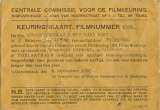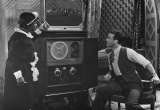Nederlands(ch)e Bioscoopbond
For years, the Nederlands(ch)e Bioscoopbond (NBB) – officially established on 18 July 1921 – called the shots in the Dutch cinema world. With its closed structure, this organisation that represented exhibitors, distributors and producers was able to reign over the cinema business and drove off all outside influences. The union grew to be an unassailable bulwark in the Dutch film world, one that defended the interests of its members from the government and foreign competition for three-quarters of a century.
A closed industry
Underlying the NBB’s founding was a conflict with the government. In February 1918, a cinema owner named W.J. van Lier in Maastricht was up in arms over both a 25% increase in the entertainment tax as well as a rule prohibiting young people from attending the cinema. Cinema owners decided to unite to fight together against the government. They started up the Bond van Exploitanten van Nederlandsche Bioscooptheaters (Union of Dutch Cinema Owners).
One year later, distributors followed their example and, on 20 January 1919, the Vereeniging van Filmverhuurkantoren (Film Distribution Offices Association) was founded. It landed immediately in a conflict with the cinema owners’ union, and both organisations decided to form an arbitration board to help solve their problems. This cooperation ultimately led to an agreement between the union and the association and, on 18 July 1921, the NBB was established. The first chairman was David Hamburger, Jr.
In 1924, the NBB came up with a ‘standard contract’ that laid out the conditions for film distribution. This contract, which applied to both distributors and cinemas hiring films, was compulsory for all NBB members. The contract also stipulated that members could not do business with non-NBB members. This last by-law was laid down by statute in 1927. Violating this could be punished with a boycott of the offending party’s business. This was how the film industry was able to operate as an autocracy with its own exclusive economic circuit.
When producers joined the NBB in the 1930s, the pact was complete, and the NBB became the omnipotent ruler of the Dutch film world.
The outside world
For outsiders, the NBB was an advocate for the cinema business. Before WWII, the film industry primarily clashed with the federal and local governments over entertainment tax rate. It also battled against local censorship boards: the NBB was a proponent of national censorship boards, which it believed would bring an end to the randomness that resulted from too many different local regulations.
After WWII, the NBB often worked jointly with the government; for example, the NBB was involved from the beginning with the Film Academy, and together with the Ministry of Education, Arts and Sciences, it was also responsible for the establishment of the Productiefonds.
The NBB also worked to promote the cinema business. There were a number of collective campaigns, especially during the rise of television, that were set up to encourage people to attend the cinema. For example, 1959 saw the introduction of the bioscoopbon (a film gift certificate) and in 1960 there was a campaign that featured the slogan, Samen naar de film….ja, gezellig (Want to catch a film together...? Sure!). That campaign would run periodically until 1966.
The most well-known campaign, however, was made for the Bio-Vacantieoorden – these were holiday resorts for sick or handicapped children. Since the 1920s, the NBB had been collecting money to build vacation houses for handicapped and destitute children. The fundraising went hand in hand with promotional films made by Polygoon.
An irreversible ending
In the 1970s and 1980s, the NBB’s foundations were shaken. There were conflicts with the Vrije Circuit (and its successor, the Associatie van Nederlandse Filmtheaters [Association of Dutch Cinemas]); a few large (primarily foreign) concerns were quickly concentrating their power by buying up more and more Dutch cinemas; and the NBB’s closed autocratic structure was running into resistance from the European Commission, which began to demand more freedom for NBB members.
A reorganisation in 1989 changed the association structure into a federative one and the Nederlandse Vereniging van Filmverhuurders (NVF) was established. On 16 July 1992, nearly 74 years after the founding of the Bond van Exploitanten van Nederlandsche Bioscooptheaters, it merged with the Nederlandse Federatie voor Cinematografie (NFC).
more information
If you are looking for more material from our collection, please contact Film Sales:
sales@eyefilm.nl
phone +31 (0)20 5891 426

